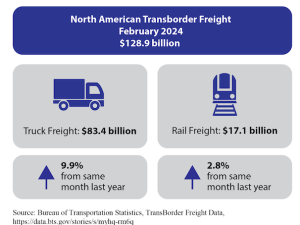US railroads show untapped value from delay in building oil pipeline
By: Reuters | Apr 22 2014 at 03:46 PM | Intermodal
U.S. railroads are obvious winners from the latest delay in the Keystone XL Pipeline approval, and some of the freight operators with the biggest growth in petroleum shipments look undervalued, according to an analysis of Thomson Reuters data.
While shares in some railroad companies have recently hit record highs, there may be still more upside potential. CSX Corp and Norfolk Southern Corp are both trading 15 percent or more below their warranted share price, according to a measure of “intrinsic valuation” tracked by Thomson Reuters StarMine.
The Obama administration’s decision to extend indefinitely the review process for the controversial oil pipeline connecting Canada with the U.S. Gulf Coast effectively cements the view that U.S. freight rail haulers are here to stay as big players in the oil-shipping business.
“Users have realized rail is a great diversification in terms of delivery of crude to the refineries, regardless of whether Keystone goes ahead or not,” said Walter Spracklin, equity research analyst at RBC Capital Markets in Toronto. “If Keystone doesn’t go ahead, it hammers home the point.”
Petroleum product volumes by freight rail rose by more than 28 percent in 2013 to 1.54 million carloads, according to data from Cowen & Co and RailShare, and oil-by-rail is by far the freight rail industry’s fastest-growing segment. So far this year, traffic is running 10 percent ahead of last year at this time.
The biggest player in the sector is Burlington Northern Santa Fe, a unit of Warren Buffett’s insurance and industrial conglomerate Berkshire Hathaway Inc , which accounts for roughly a third of U.S. oil-by-rail traffic.
It is followed by Union Pacific Corp, Norfolk Southern, CSX and Kansas City Southern.
Union Pacific shares on Monday hit an all-time high, gaining 1 percent to close at $191.54, while Berkshire’s A shares touched their record last Thursday: $191,506. But both are trading near their full valuations, according to intrinsic valuation tracked by Thomson Reuters StarMine.
StarMine calculates a stock’s intrinsic value using profit growth estimates from the most accurate analysts tracking the shares.
By that measure, the two freight haulers with the largest year-to-date gains in oil-by-rail volumes, CSX and Norfolk Southern, are both trading 15 percent or more below their warranted share price.
Both saw their crude-related volume rise more than 50 percent last year, to about 2 percent of the overall volume each moved. So far this year, CSX’s petroleum product volume is up by 59 percent and Norfolk Southern’s is up by 27.5 percent.
On Monday, CSX shares closed at $28.18, but StarMine pegs their intrinsic value at $33.32, representing an upside of around 18 percent. For Norfolk Southern, which ended the day at $96.89, the intrinsic value model price is $115.
Meanwhile BNSF’s crude-related volume, which rose 42.6 percent in 2013 to account for 5 percent of its total carloads, is up by just 10.7 percent this year.
To be sure, the valuation picture for Berkshire is more nuanced than its rail industry rivals given that BNSF accounted for just 12 percent of the conglomerate’s revenue in 2013 but more than 20 percent of Berkshire’s pretax profit.
Still, it is growing fast enough to have justify plans for Berkshire to buy up to 5,000 new tanker cars rather than lease them as is typically done by rail operators.
“Keystone shows new pipelines are difficult to get approved,” RBC’s Spracklin said. “Crude by rail is not difficult. It’s a very flexible service.” (Reuters)








